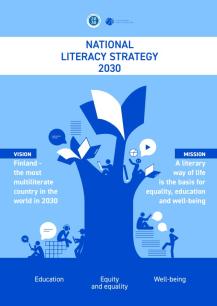Finnish national literacy strategy 2030

The National Literacy Strategy includes concrete objectives and measures for strengthening the diverse literacy skills of people of all ages in Finland. Sufficient tools must be developed for the assessment of literacy skills and literacy work. The aim of the National Literacy Strategy is a strong, diverse and inclusive reading culture which reinforces the success of Finland and the good life of its citizens. In the Strategy, literacy is defined as multiliteracy, which includes the skills of reading and producing all kinds of texts from traditional written texts to, for example, audiovisual presentations. From the point of view of the implementation of the Strategy, both the resources and the attitude to doing literacy work are important. The work must be persevering and goal-oriented development, which requires systematic planning and cooperation across administrative boundaries. When implementing the Literacy Strategy, it is necessary to take into account the development programmes and policies recorded in the Government Programme. At best, they support national and local literacy work. These include, for example, the Right to Learn development programmes, the New Literacies Programme and Media literacy in Finland – National media education policy (2019). The National Literacy Programme 2030 defines the parties responsible for the measures and a timetable for their implementation will be drawn up to support the implementation of the Literacy Strategy. In addition, the programme will include subprogrammes, such as the Literate School, Literate Municipality and Literate Early Childhood Education and Care programmes, which will be used to introduce literacy work into practice together with local actors. The Literacy Programme will create a concrete map to describe the basic work and cooperation of the different actors. It is also important to include research and impact assessment in the programme.